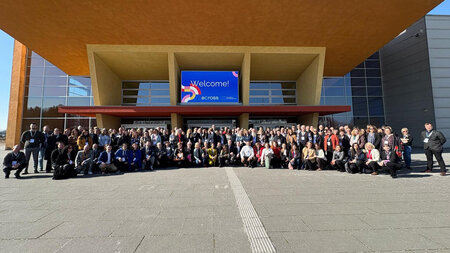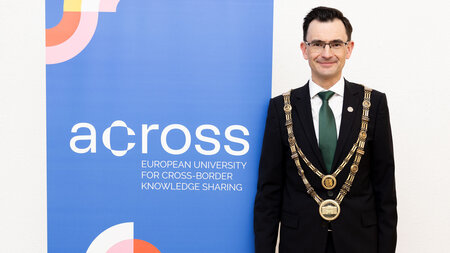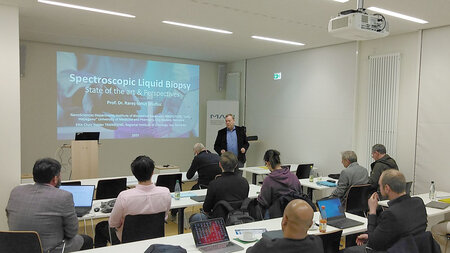It’s the Little Things that Matter
Focus on Nanoscience: the first “NANO-TECH” Summer School helps to intensify the TU Chemnitz’s cooperation with the Arabic world
-

The Professorship of Semiconductor Physics will also contribute their expertise to the summer school. Shown here: Jana Kalbacova and Dr. Raul Rodriguez make adjustments to a spectrometer for tip-enhanced Raman scattering, with which materials can be analyzed with a spatial resolution of just a few millionths of a millimeter. Photo: Pressefoto Schmidt
In cooperation with the University of Jordan, the Technische Universität Chemnitz will hold the first “NANO-TECH” Summer School. From September 25 through October 1, Master’s students and doctoral candidates from Jordan as well as Chemnitz will attend the one-week-long course program at the TU Chemnitz. Afterwards, they will continue in Amman, Jordan from October 8-13. The primary aim of the German-Arabic summer school is the training and continuing education of the approximately 20 nanoscience students, with particular focus on the underlying physical and chemical laws and relationships. Scientists and young researchers from various disciplines will be brought together to enable future interdisciplinary and international cooperation among the natural sciences of physics, chemistry, engineering and material sciences. Great importance is attributed to the close connection between theoretical and practice-oriented research.
Research in nanoscience occupies one of the top positions in the scientific landscape. The core competencies of the TU’s Faculty of Natural Sciences, with its two Institutes of Physics and Chemistry, include research on “Smart Systems and Materials” with special focus on nanoscience. “Through the participation of three of the TU’s faculties as well as the participation of the natural science divisions of the University of Jordan, not only the transdisciplinarity of the subject matter is emphasized, but also the internationality of the summer school,” explains Prof. Heinrich Lang, Vice-Rector for Research and Promotion of Young Scientists at the TU Chemnitz and also the program’s initiator. The summer school’s scientific program aims to strengthen the focus area of nanoscience in the Arabic world. Through various lectures, participants of the summer school will receive an overview of diverse kinds of nanostructures, their creation, analysis as well as their application potential. All seven participating German lecturers are proven scientists with autonomous research fields and profiles in the world of nanotechnology, who successfully work together on a multidisciplinary level at the TU Chemnitz. As a special highlight, chemist Dr. Andrea Mayer-Figge from the Ministry of Labour, Integration and Social Affairs of the State of North Rhine-Westphalia will also speak at the summer school. In addition, doctoral candidates from the TU Chemnitz and from Amman will present the results of their doctoral work in a short presentation about their area of research. “Nanoscience is an innovative field which has historically been only marginally appreciated in the Arabic world. The aim of this summer school is to enable young researchers from that region to gain valuable experience dealing with the most up-to-date topics and then subsequently apply this knowledge scientifically on the international stage,” emphasizes Lang.
The two-part summer school’s subject matter will focus on the fields of synthesis, analysis and theory of nanomaterials in nanotechnology as well as the demonstration of various different potential applications. General, comprehensive topics in nanotechnology will be dealt with during the five-day event held at the university in Chemnitz, in order to create a knowledge base for all involved. At the same time, participants will have the opportunity to complete internships in the university’s laboratories and expand upon their theoretical knowledge in a practical setting. The scientific program will be supplemented with excursions to selected industrial operations in the economic region of Chemnitz. When the summer school continues at the university in Jordan, the subject matters that were previously covered in Germany will be discussed and evaluated in-depth by means of lectures and seminars.
Following the conclusion of the summer school, the three best participants will be invited to the TU Chemnitz for two months in order to apply their newly-acquired knowledge and skills in the university’s excellently equipped laboratories. Under direct supervision and guidance, the young Arabic researchers will be able to research various aspects of the innovative field of nanotechnology and simultaneously establish international scientific connections.
(Author: Katharina Preuß, Translation: Sarah Wilson)
Mario Steinebach
30.05.2016





